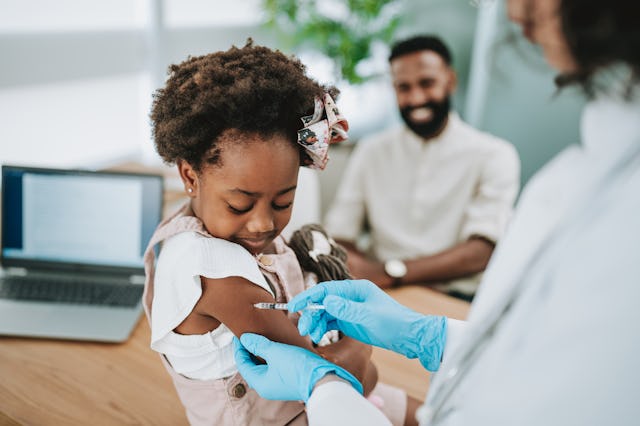Here’s Everything You Need To Know About Vaccines & Placebo Testing Requirements
HHS wants placebo testing for all new vaccines, but many scientists are pushing back.

On May 1, the Department of Health and Human Services (HHS) announced changes to the way the United States conducted vaccine trials. While some have applauded this change as a much needed move towards transparency and heretofore lacking precaution, many experts have decried the still largely unclear announcement as unnecessary, costly, and dangerous. Here’s what you need to know.
HHS announced new safety testing for all new vaccines
In a statement published by The Washington Post, HHS spokesman Andrew Nixon announced “All new vaccines will undergo safety testing in placebo-controlled trials prior to licensure — a radical departure from past practices.” He went on to say that “except for the COVID vaccine, none of the vaccines on the CDC’s childhood recommended schedule was tested against an inert placebo, meaning we know very little about the actual risk profiles of these products.”
At first blush, the suggestion sounds downright reasonable: we should be testing vaccines thoroughly! How ridiculous that we haven’t! But here’s the catch...
Placebo testing for vaccines is not new
New vaccines are typically developed with a randomized, double-blind and placebo-controlled trial. Participants are either given the experimental new vaccine or an inert substance (generally saline) at random. Neither the person giving nor receiving the treatment knows which one. This minimizes bias and helps to prevent intentional or unintentional tampering of the results. While Kennedy has claimed that vaccines do not go through such testing, that is not in fact the case. Dr. Peter Hotez — Dean for the National School of Tropical Medicine at Baylor College of Medicine and co-director of the Texas Children's Hospital Center for Vaccine Development — countered that claim with an extensive (but not exhaustive) list of childhood vaccines developed with placebo-controlled trials posted to X.
The HHS’s definition of “new vaccine” is unclear
That leaves the question of what the agency would consider a “new” vaccine.
A department spokesperson told ABC News, “FDA Commissioner Dr. Marty Makary has indicated that significant updates to existing vaccines—such as those addressing seasonal strain changes or antigenic drift—may be considered 'new products' requiring additional clinical evaluation.”
That is to say that any update to a vaccine — in order to make it more effective against particular strains of a mutating virus — would have to undergo a placebo trial, which is not currently standard practice.
While Nixon specifically noted that the flu vaccine has proven safe and effective when updated over the course of 80 years, he seemed to indicate this would not be the case for the annually updated Covid vaccine.
“As we've said before, trials from four years ago conducted in people without natural immunity no longer suffice,” Nixon told The Washington Post. “A four-year-old trial is also not a blank check for new vaccines each year without clinical trial data, unlike the flu shot which has been tried and tested for more than 80 years.”
So what’s the problem?
Some fear this new requirement is unnecessary and will limit vaccine availability
Because double-blind trials are timely and expensive, some experts fear that this would delay the development of these vaccines and — according to director of the Vaccine Education Center at Children’s Hospital of Philadelphia Paul Offit — make them “less available and less affordable.”
“You are watching the gradual dissolution of the vaccine infrastructure in this country,” he told The Washington Post. He suggests the lack of availability is, in fact, the goal of the administration. HHS, however, has emphasized this move is motivated by a desire to “accurately measure vaccine risks as well as benefits — because real science demands both transparency and accountability.”
Others say giving a placebo when there is already an effective treatment is unethical
In a statement, Dr. Seema Shah, a professor of pediatrics at Northwestern University Feinberg School of Medicine and the director of research ethics at Ann & Robert H. Lurie Children's Hospital of Chicago likened such requirements for vaccine updates to making basketball players try out for the team before every game. She categorized such a policy as “a waste of everyone’s time and money.”
But her chief concern lies in the ethics of such trials. While there are instances when placebos for existing medications or vaccines are ethnically sound, that is not always the case.
“If we have vaccines or treatments that work, it’s wrong to give some research participants nothing,” she said, continuing. “For many diseases, scientists already know how to measure if the vaccine is giving the immune system the information it needs to fight the disease, and there is no need to use a placebo injection.”
The World Health Organization (WHO) also agrees that while there are circumstances in which a placebo-trial for a vaccine is the right thing to do, there are instances in which “clearly unacceptable,” and that discerning between the two must be done on a case-by-case basis.
Shah agrees.
“A blanket rule to use placebos will force scientists to treat people unethically,” she says. “It seems like another way to gum up the works so fewer people will be protected against infectious diseases in the future.”